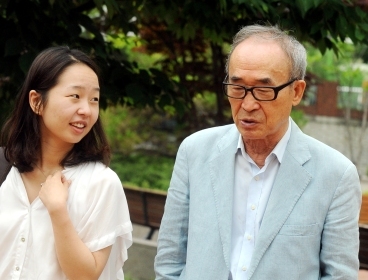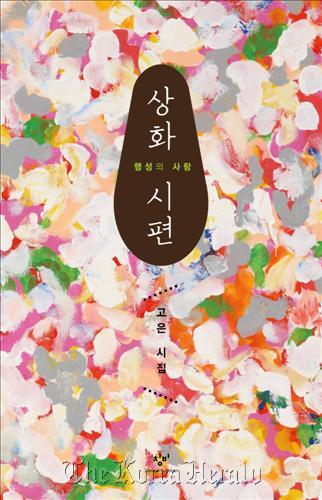
Highly acclaimed poet publishes his first collection of love poems
Dressed in a sky blue blazer and wearing his signature glasses with black plastic frames, poet Ko Un could not hide his spontaneous, child-like nature on Friday afternoon.
“Let’s do this interview in my car!” he insisted, getting rather excited. “I know Umberto Eco has been interviewed that way. It would be fun!”
Ko had just finished his special lecture at Nowon Arts Center in Northern Seoul, having some hundreds of middle school students and adults as his audience. After strolling through a park for a photo shoot, he invited me for a lunch then into his vehicle for the interview.
So there we were, in his car, with his driver in waiting, the highly acclaimed poet started talking about one of the most universal human subjects -- love. It’s a subject he has not written about during his 50-year career until recently.
“Love never dominates but serves,” he told The Korea Herald. “It is in fact about respecting and serving the person to the degree that you’d rather be dominated by him or her.”

The poet, whose books have been translated and published in more than 20 countries worldwide, has recently published his very first collection of love poems, “Sanghwa: Love of a Planet.” He has dedicated the book to his wife, professor Lee Sang-wha at Chung-Ang University, whom Ko calls as his goddess and savior.
Ko said the phrase “love of a planet” refers to our mother earth and all of its living creatures.
“The earth is the only planet where we human beings are allowed to love one another,” he said. “And it’s not just the human kind. All living creatures share love on this planet. But my love has been with my wife, and it’s been extremely touching 30 years. I wanted to write about that in my poetry.”
Ko said love is something that is on-going and constant, rather than an accidental event. “Many people say love ends upon marriage,” he told The Korea Herald. “But I think love is some kind of music that continues throughout our long ordinary lives, rather than an accident or a short-term drama.”
The 78-year-old Ko married Professor Lee in 1983, after going through a series of imprisonment for his pro-democracy activism and failed suicide attempts. He suffered from severe trauma mostly stemmed from his experience during the Korean War (1950-1953). He had been a Buddhist monk, as well as a teacher at a charity school on Jeju Island before marrying Lee.
“I don’t think I’d be alive right now if I didn’t marry my wife,” Ko told The Korea Herald. “She literally has changed my life and my writing career has been with her ever since.”
The newly published collection is filled with Ko’s ordinary joys and personal moments, including the couple’s wedding; big and small arguments; riding bikes together; Lee’s peaceful pregnant days; and the joy of waiting for his wife’s daily return.
Ko used his own painting, which he presented as a gift to his wife on her birthday a couple of years ago, for the cover of the new collection. “I also secretly included one of my wife’s poems in the collection,” he said, laughing. “She gave it to me as a gift on our wedding anniversary this year.”
Along with “Sanghwa: Love of a Planet,” Ko also published another collection, “Where Have My Borders Gone?”
“I think it’s almost violent to consider one place as the center of many lives,” Ko explained about the title of his collection. “I wanted to emphasize that any life at any location is precious and deserves dignity.”
Many poems in the collection were written in different locations -- including California, Frankfurt, Port Hamilton and airports -- inevitably reflecting Ko’s wanderlust. “I loved riding handcarts as a child and I love taking airplanes now,” Ko told The Korea Herald. “And when I am overseas, I hardly think of kimchi. I love food from everywhere, though I do really love pasta.”
Having been often considered a likely winner of the Nobel Prize in Literature, Ko’s works have been highly received in foreign countries. “I’ve been certainly lucky,” Ko said. “My poems cannot be defined in one sense. Many things have made me write poems. My motherland’s mountains, skies, dewdrops, snow, rain, and the air constantly pushed me to write. But I am also inspired by the Atlantic Ocean, the outer space, and the Himalayas.”
The poet said he has been getting countless invitations from foreign countries for the last 20 years. “I usually turn down six to seven invitations and accept two to three a year,” Ko told The Korea Herald. “I was in Prague this year and planning to visit Norway next year.”
Despite today’s ever changing world, Ko said he firmly believes poetry will last till the very last day of the human kind. “Poetry has been with us just like our ears, eyes, hearts and hair have been with us,” he said. “There is no way poetry will die. It just won’t.”
The two newly published collections will be translated into English in next two years, Ko said.
By Claire Lee (dyc@heraldcorp.com)








![[KH Explains] How should Korea adjust its trade defenses against Chinese EVs?](http://res.heraldm.com/phpwas/restmb_idxmake.php?idx=644&simg=/content/image/2024/04/15/20240415050562_0.jpg&u=20240415144419)










![[Today’s K-pop] Stray Kids to return soon: report](http://res.heraldm.com/phpwas/restmb_idxmake.php?idx=642&simg=/content/image/2024/04/16/20240416050713_0.jpg&u=)